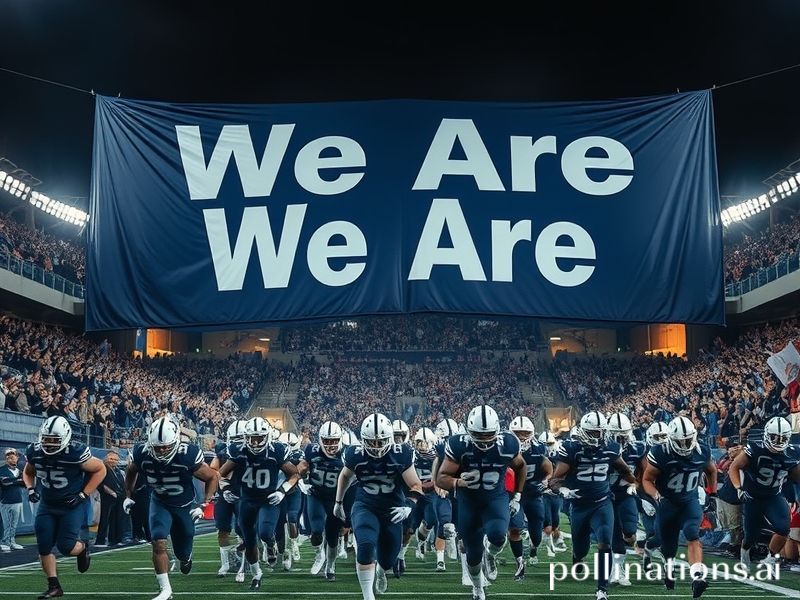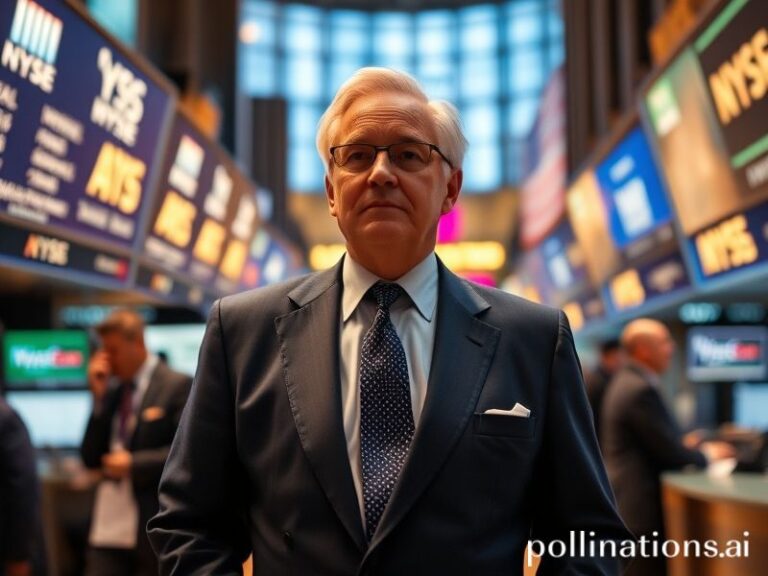Gridiron Empire: How Penn State’s Bronze Lion Roars Across a Burning Planet
Beaver Stadium at twilight looks like any other concrete leviathan—until you realize 110,000 people have voluntarily gathered in rural Pennsylvania to watch twenty-year-olds risk CTE for a bronze sculpture of a mountain lion that has never actually existed in the wild east of the Mississippi. Across the Atlantic, Ukrainians huddle in metro stations wondering if the power will last the night; in Happy Valley, the only existential question is whether the student section will run out of “We Are” before the opposing quarterback runs out of ribs.
Welcome to the global theater of Penn State Nittany Lions football, where geopolitics are reduced to whether the White Out will be visible from the International Space Station (answer: yes, and the astronauts report it’s still quieter than a Moscow grocery store). To the uninitiated, this is merely American excess—colossal bands, tailgates that begin with Bloody Marys and end with vehicular arson, and a lion mascot whose costume budget could float the Maldivian navy. To the faithful, it’s a weekly ritual purer than democracy, which is ironic because the replay booth has more cameras than most UN peacekeeping missions.
From Singapore to São Paulo, the game streams at ungodly hours on ESPN Player, luring insomniacs and expatriates who crave the uniquely American cocktail of hope, grievance, and cholesterol. A Nairobi tech consultant sets his alarm for 3:47 a.m. to watch a freshman slot receiver who once retweeted him; a Glasgow pub opens early, serving “State College Stout” that tastes like burnt nostalgia. These viewers aren’t just consuming sport—they’re downloading a 60-minute allegory about empire in decline: immense resources, dazzling pageantry, and a lingering suspicion that the whole spectacle is mostly there to sell insurance.
The economic footprint is equally planetary. Nike ships special “Land-Grant” jerseys sewn in Ho Chi Minh City sweatshops, each fiber a testament to the efficiency of global supply chains and the inefficiency of American moral consistency. Qatar Airways sponsors the halftime show, presumably to remind fans that if you can fly a soccer World Cup into the desert, you can certainly fly a marching band into moral ambiguity. Meanwhile, Penn State’s athletic department cuts a seven-figure check to the Big Ten, which then spends it on lobbying for tougher visa rules against the very countries stitching its logos.
And then there’s the matter of reputation laundering—every autumn Saturday, an institution once synonymous with the ugliest scandal in college sports transforms itself into a postcard of Americana. The chants drown out the lawsuits; the marching band forms script “PSU” so large it can be read by spy satellites and, presumably, by the gods of karma, who must be nearsighted. International viewers, accustomed to FIFA-level corruption, nod knowingly: same circus, different clowns, better cheese fries.
Yet there’s something almost noble in the futility. The team’s best linebacker is majoring in cybersecurity, preparing to defend the nation’s routers from Moscow while his own coach still can’t figure out how to use the tablet on the sideline. The star receiver’s NIL deal with a local car dealership is worth more than the GDP of Tuvalu, but he still has to share a dorm with a philosophy major who believes the entire program is a Foucauldian panopticon—an argument harder to refute after the third replay review.
When the final whistle blows and the crowd spills into the night, the stadium lights dim against a sky still bright enough for Europe to watch the post-game handshake. Somewhere in Lagos, a data analyst closes his laptop and wonders what it would feel like to care that much about anything. In the parking lots of State College, students care so much they flip an SUV for the third time this season. Somewhere between those extremes lies the global significance of Penn State football: a weekly reminder that humans, given enough beer and brass instruments, will build cathedrals to anything—then argue about the officiating until the oceans rise.
The bronze lion remains unmoved, which is more than can be said for the rest of us.







